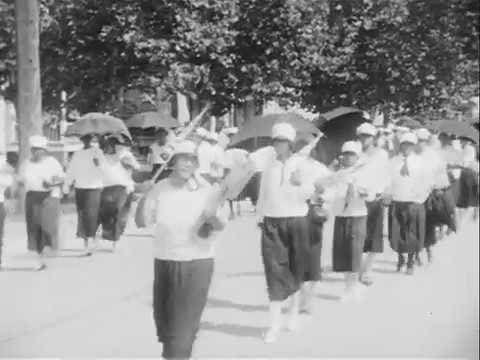Infophilia, a Positive Psychology of information | June 19, 2025 | Vol. 3, Issue 36 | Bonus edition
✨Welcome to Infophilia, a weekly letter on how our love of information and connections can help the whole planet flourish.
Cite as: Coleman, A. S. (2025). A Juneteenth celebration 100 Years Ago: The Solomon Sir Jones Silent Films, Bienecke Library at Yale. Infophilia, a positive psychology of information, 2 (36).
A Juneteenth celebration 100 Years Ago
The Solomon Sir Jones Silent Films
Last week’s essay on A Civic Infophile Ahead of her Time: Eliza Atkins Gleason (1909-2009) sparked a conversation on identity labels. Thanks to Tim Blackwell, a reader of Infophilia, we learned that some communities now use the term “melanated” as a positive, affirming label for people with darker skin tones, with “non-melanated” being used for whites. This term has been in use since at least the mid-20th century and reflects evolving language around racial and cultural identity.
One of the most significant moments in American history is Juneteenth, marking the true Emancipation and Independence Day for most African Americans.
On June 19, 1865, Union troops arrived in Galveston, Texas, to announce and enforce the emancipation of enslaved people, issuing General Order No. 3 and making the freedom promised by the Emancipation Proclamation a reality. While the Emancipation Proclamation had been signed more than 2 years earlier (January 1, 1863), it could not be effectively implemented in Texas until Union forces arrived. The news and enforcement of emancipation also spread to neighboring regions, including what is now Oklahoma, where enslaved people in Indian Territory received word of their freedom at different times during the summer of 1865. In both Texas and Oklahoma, Juneteenth — also known as Emancipation Day, Juneteenth Independence Day, and Black Independence Day — has been honored and celebrated by African Americans for generations.
Then, a few years ago, in 2021, Juneteenth became the newest (paid) federal holiday. Now, all Americans have the chance to celebrate it as well with festivities, food, and parades, often organized by local communities.
But Juneteenth is not only a day of celebration and community. It is also one of reflection, honoring Black freedom, resilience, and achievement.
Whether you’re in the U.S. or elsewhere, Juneteenth is an opportunity to learn, reflect, and stand in solidarity with everybody who is working for equality everywhere. So, here we go.
The Solomon Sir Jones Films, part of the Yale University collection, offer rare footage of Juneteenth celebrations. These 29 silent black-and-white films document African-American communities in Oklahoma from 1924 to 1928. The films capture a rich tapestry of everyday life, including parades, funerals, sporting events, schools, businesses, Masonic meetings, river baptisms, families at home, African-American oil barons and their wells, black colleges, and Juneteenth celebrations.
Featured Video: A 2-minute 28-second clip from one of the silent films showcases the National S. S. Congress Parade on Magnolia St. in Beaumont, TX, on June 14, 1925, the Sunday before Juneteenth. The video shows Black residents participating in a parade, waving flags, and celebrating their freedom and place in society. This was during the Jim Crow era (time of legal segregation from 1877 to mid-1960s). This film is thus not only a vivid portrayal of community pride and organization but a valuable record of African American public life and cultural expression.
Solomon Sir Jones was a Baptist minister and businessman who also had an important career as an accomplished amateur filmmaker. Born in Tennessee to former slaves and growing up in the South before moving to Oklahoma in 1889, Jones documented a significant period in African American history. His films give us a glimpse into the lives of African Americans during the Great Migration, a time of rapid social and cultural change.
I wish you a joyful Juneteenth.
Notes
“melanated.” Merriam Webster Dictionary. https://www.merriam-webster.com/dictionary/melanated | skin with high concentrations of melanin and of or relating to being a person of color and especially a Black person.
While every U.S. state has at least passed a resolution or law recognizing Juneteenth as a day of observance or awareness, not all provide a paid holiday for state employees (for example: Arizona, Florida, Hawaii, Indiana, Mississippi, Wisconsin, Wyoming, etc)
On Juneteenth, the Congressional Research Service notes: “Juneteenth celebrates the end of slavery in the United States. It is also known as Emancipation Day, Juneteenth Independence Day, and Black Independence Day. On June 19, 1865, Major General Gordon Granger arrived in Galveston, TX, and announced the end of the Civil War and the end of slavery. Although the Emancipation Proclamation came two and a half years earlier on January 1, 1863, many slave owners continued to hold their slaves captive after the announcement, so Juneteenth became a symbolic date representing African American freedom.”
Solomon Sir Jones films. Beinecke Rare Book & Manuscript Library, Yale University Library. https://beineckelibrary.aviaryplatform.com/collections/1058
2025, May 28. View rare historic film of 1925 Juneteenth celebration on Yale Library Digital Collections. Yale Library. https://library.yale.edu/news/view-rare-historic-film-1925-juneteenth-celebration-yale-library-digital-collections
Great migration refers to the six million African Americans who moved from the rural South to urban areas in the North, Midwest, and West of the United States, 1910 to 1970 (in two migration waves) and reshaped American demographics.
Juneteenth and the Solomon Sir Jones Films. [YouTube] June 18, 2019. Beinecke Library at Yale.



